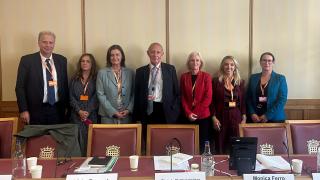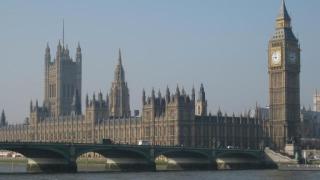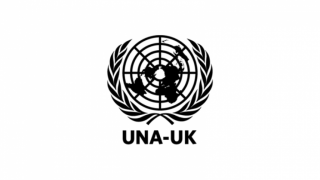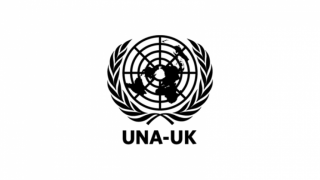
On 9 September, the All-Party Parliamentary Group (APPG) on the United Nations held a high-level briefing focused on the global humanitarian situation and the current funding crisis. These briefings serve as an important forum for Parliamentarians to receive updates directly from UN Agencies, informing their advocacy and guiding potential avenues for action.
The event brought together senior representatives from key UN agencies and the ICRC to outline the consequences of significant aid cuts, particularly those from the United States, and to discuss how agencies are adapting in an increasingly challenging operating environment.
Opening the session, Lord Hannay acknowledged the devastating impact of the aid reductions but urged against despair, framing the briefing as an opportunity for dialogue on how agencies are responding, adjusting, and identifying new approaches in the face of shrinking resources.
Monica Ferro, Director of the United Nations Population Fund (UNFPA)'s London Office, described the scale of the current funding shortfall as unprecedented, warning that humanitarian support for women and girls is being dismantled in real time. UNFPA has identified ten neglected and severely underfunded crises, including those in Haiti, Sudan and the Democratic Republic of Congo, where critical services such as midwifery, emergency obstetric care, and support for survivors of gender-based violence are being lost. In Afghanistan, the withdrawal of US funding alone has led to the projected closure of hundreds of health facilities and the loss of employment for over 1,300 female service providers. Ferro emphasised the need to rethink the current humanitarian model to ensure that gender-based violence prevention and sexual and reproductive health are treated as essential, life-saving interventions.
Joanna Rea, Director of Advocacy at UNICEF UK, outlined how the cuts are directly impacting children. With one in six children worldwide now living in conflict zones, reductions in health and education services are pushing millions further into vulnerability. Six million children are expected to miss out on education due to funding shortfalls, and projections estimate an additional 14 million preventable child deaths by 2030. She stressed the urgent need to reinvest in long-term systems and ensure children remain central to global humanitarian priorities.
From UNHCR, Vicky Tennant, Representative to the United Kingdom, spoke of the increasingly complex displacement landscape. While new displacements continue, large numbers of people are also returning to highly unstable environments such as Afghanistan, with limited support. UNHCR has been forced to reduce its operational scale and workforce by a third and is now struggling to maintain core services, including refugee registration. Tennant noted that while more funding is being channelled through local partners, overall capacities are diminishing, and greater flexibility in funding is urgently needed.
Christa Rottensteiner, Chief of Mission of the International Organization for Migration (IOM) UK, reflected on the challenge of responding to an unprecedented level of displacement, now exceeding 120 million people worldwide. She reported that IOM has scaled back operations in more than 40 countries, affecting over 9 million people. These reductions are contributing to rising instability, eroding development gains, and forcing people to move again,making them more vulnerable to traffickers and smugglers. Rottensteiner argued for migration to be recognised as a positive force for development and called for a return to the UK’s 0.7 percent GNI aid target.
Geraldine O’Callaghan, Director of the World Food Programme (WFP) Global Office in London, painted a stark picture of global food insecurity. With needs soaring to over 300 million people globally, WFP has seen a 34 percent decline in funding this year. As a result, the agency will assist 21 percent fewer people with emergency assistance than in 2024, with severe consequences already observed in locations such as Gaza, South Sudan, Afghanistan and Yemen. O’Callaghan emphasised the role of parliamentarians in shifting the public and political narrative in the UK, making the case that supporting humanitarian assistance is also a matter of national security.
Finally, Philip Spoerri, Head of the Regional Delegation for the UK and Ireland at the International Committee of the Red Cross (ICRC), warned that as humanitarian needs rise, the ICRC is reducing its 2026 budget by 17 percent, with difficult trade-offs expected. Spoerri drew attention to the growing number of conflicts, now over 130 globally, and the increasing operational risks faced by humanitarian staff. He underlined the importance of continued investment in International Humanitarian Law and conflict prevention as strategic, long-term responses.
Across the board, representatives from the UN Agencies called for more predictable, flexible funding and greater public engagement. As Lord Hannay concluded, a smarter, collaborative and purpose-driven approach is needed, one that meets today’s realities while preparing for tomorrow’s challenges.
UNA-UK acts as the secretariat for the UN APPG. For more information on the group and its activities, please contact Lauren on muir@una.org.uk.






